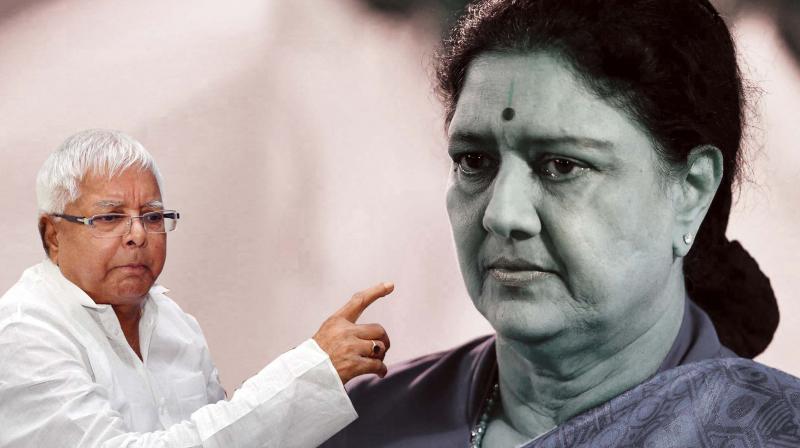Tamil Nadu in fear of becoming laughing stock of India

“O Liberty! What crimes are committed in thy name!” — Madame Roland, said in 1793 when imprisoned Substitute democracy for liberty in one of most famous quotations from the time of the French Revolution and you could well say this of what is happening currently in Tamil Nadu.
Once considered a model state in terms of following democratic norms in the legislature, Tamil Nadu has come down so much it is the laughing stock of the nation now.
Whatever happened in the Assembly on Saturday was symbolic of the shambolic times we live in when political power is the sole ambition of the ruling class and the welfare of the people they represent are the farthest from their minds.
The naked power game played out in public since February 5 may have kept newsmen busy as they tried to convey what was happening in a state suddenly gone mad, its capital obsessed with the ambitions of a set of legislators who wished to hang on to power at any cost.
Now, there is nothing wrong in aspiring for power, nor for trying to retain it. But did any legislator of the ruling group think for a moment about what the people they represent wanted?
How many of them consulted the people who elected them as to what they should do in this constitutional crisis created by one person wishing to occupy the high chair?
They were too busy being entertained in a resort where they were sequestered so that they may not fall prey to the philosophy or offerings of the other group in the intra-party wrangle for power among a habitual caretaker CM, an ambitious live-in confidante of a chief minister who was later convicted for graft and sent to prison and a new chief minister who was plucked out to be a proxy.
To what levels democracy has plunged could be seen in the hundreds of marshals and policemen in ‘disguise’ as marshals after being invited in by the assembly secretariat doing their bidden job of dragging MLAs out of the Assembly. You could blame the Speaker for this spectacle. But then has there ever been a bipartisan Speaker in modern Indian history? He is a ruling party legislator masquerading as Speaker whose importance goes up when he has to be the referee in a floor test.
History and precedent were on Speaker Dhanapal’s side as all floor tests in Tamil Nadu have been by show of hands. But then this one came in extraordinary circumstances of resort politics wherein MLAs were herded into the comfort by the side of the sylvan Koovathur backwaters.
We can’t blame the Speaker for he is an AIADMK legislator to begin with and he was free to choose which faction he would throw his weight behind. His fault lay in acting only at the behest of his faction and not considering even a logical request for a secret ballot.
If secret ballots are to be shot down on the basis of what it will do to encourage horse-trading, then we may as well have open elections in the country where each voter has to declare who he is voting for in public.
Maybe, after the Tamil Nadu experience, the Constitution should be changed to make voting in floor tests compulsorily by secret ballot, although how then to get around the law on party whips would be a tricky question.
The law is, however, an ass. It takes only one Indian to show that up. Lalu Prasad Yadav has played ducks and drakes with the law after being convicted for corruption.
He moved his wife from the cattle shed in his home to the Assembly to be sworn-in as chief minister. Enter the big era of proxy CMs, which is back in Tamil Nadu. This state is no stranger to proxy CMs as it had hosted one in Mrs Janaki Ramachandran, who was propped up as CM by certain people in 1988.
Lalu cocked a snook at modern India by showing what all he can do to mock the Prevention of Corruption Act while roaming around freely as a legal way was found to get the verdict of conviction suspended.
He can’t be an MLA but he could do everything else in politics with a remote control in his hand. He is free to form alliances, talk in public, seek votes for his party, kin and so on. Now judge if the law is an ass or not.
The total ‘disconnect’ between the voters and those they vote in as their representatives in Assemblies and in Parliament has become the biggest threat to Indian democracy.
If elected representatives join together to form a kleptocracy, it is the future of the country that is in peril. Tamil Nadu has become an extreme example of this in Jaya’s regime and in that of her proxies. This is where the danger lies more than in trust votes and the manner in which they are run.

